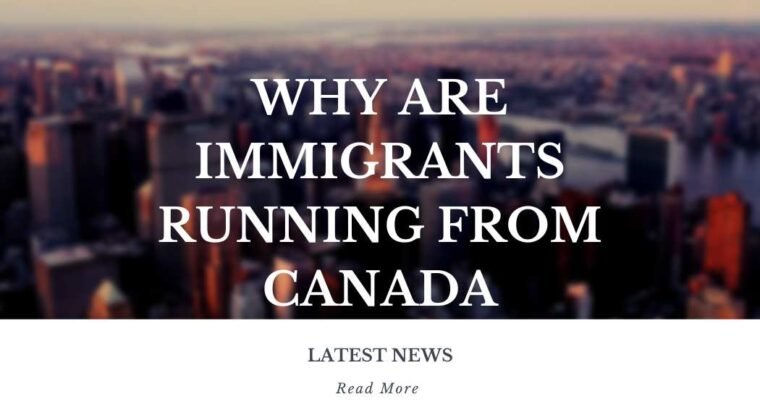Why Are Immigrants Running From Canada?
Many people wonder why some immigrants are choosing to leave Canada. The main reasons often include high living costs, job market challenges, and a search for better opportunities elsewhere. These factors can make settling in Canada feel difficult, leading some to seek greener pastures in other countries.
As cities grow and housing prices climb, newcomers may find it hard to establish themselves financially. The job market can also be competitive, making it tough for immigrants to find work in their fields. This combination of pressures can push them to explore options in places that offer better prospects.
In addition to economic factors, a desire for family connections and community can influence these decisions. Immigrants often leave Canada for regions where they have familial ties or where they think they can create a more fulfilling life. Understanding these motivations provides insight into the experiences of those who choose to leave.
Factors Driving Immigrants Away from Canada
Several important factors can lead immigrants to seek opportunities elsewhere. These include economic challenges, political climate, and social issues that affect their lives in Canada.
Economic Challenges
High living costs play a major role in driving immigrants away from Canada. Many find that their salaries do not keep up with the expenses of housing, groceries, and healthcare.
In cities like Toronto and Vancouver, rent prices skyrocket, making it difficult for newcomers to afford a place to live. The lack of affordable housing options limits their financial stability.
Additionally, some immigrants face barriers in the job market. Their qualifications may not be recognized, leading to underemployment. This situation can create frustration and a desire to move to countries with better job opportunities.
Political Climate
The political environment in Canada can also influence immigrants’ decisions. Some may feel that the current policies do not support their needs.
Changes in immigration laws and procedures might create uncertainty. This anxiety can push individuals to explore other nations that offer more favorable conditions for settling down and building a future.
Furthermore, debates around immigration can foster a feeling of exclusion. If immigrants feel they are not welcomed, their desire to remain diminishes.
Social Issues
Social integration is another significant concern. Many immigrants experience difficulties in finding community support. Language barriers can hinder their ability to connect with others.
Cultural differences may cause feelings of isolation. In some cases, newcomers face discrimination, which can discourage them from staying in Canada.
This combination of factors contributes to a challenging social environment for immigrants. As a result, many opt to leave in search of a more welcoming atmosphere in different countries.
Consequences of the Migration Trend
The trend of immigrants leaving Canada can lead to significant changes in various areas. These include effects on the economy, shifts in cultural diversity, and the need for changes in immigration policies. Each of these aspects plays a crucial role in understanding the broader implications of this migration.
Impact on Canadian Economy
The departure of immigrants can have mixed effects on the Canadian economy. As immigrants often fill critical job roles, their exit may lead to labor shortages in various sectors. Businesses that rely on skilled labor may struggle to find replacements, which can slow down growth.
Additionally, a decrease in population can result in lower consumer spending. Fewer people in the market mean less demand for goods and services. This drop in demand can affect small businesses and large corporations alike, leading to potential layoffs or closures.
Furthermore, tax revenues may decline. Immigrants contribute to public finances through taxes. With fewer immigrants, the government might face challenges in funding programs and services.
Changes in Cultural Diversity
Cultural diversity in Canada benefits from a steady influx of immigrants. When people leave, the cultural landscape may shift, leading to a reduction in diversity. Fewer new perspectives can impact the richness of Canadian society.
Communities often thrive on the contributions of various cultural groups. Restaurants, festivals, and local customs reflect this diversity. A decline in immigrant populations can mean fewer cultural exchanges and experiences.
Additionally, schools may see changes in enrollment. With fewer immigrant families, classrooms might become less diverse. This can affect students’ social experiences and understanding of different cultures.
Effect on Immigration Policies
The trend of immigrants leaving Canada can prompt a reevaluation of immigration policies. Lawmakers may need to consider the reasons behind this trend to better address the needs of potential immigrants.
If high numbers of immigrants are leaving due to economic or social factors, the government might introduce new programs to improve retention. Targeted support for specific communities could become a priority.
Changes could also aim to make Canada a more attractive destination for newcomers. Adjustments in visa processes, job opportunities, and settlement services might be explored to enhance the immigrant experience.
You must be logged in to post a comment.
